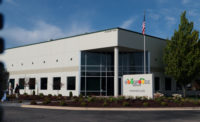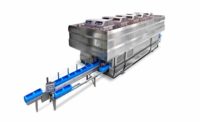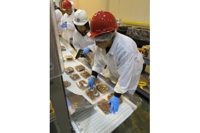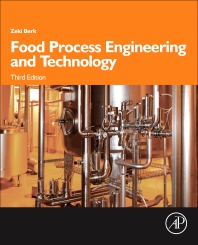Sandridge plant adopts HPP
Refrigerated foods processor Sandridge Food Corporation said it installed a high-pressure processing (HPP) system at its Medina, Ohio, plant. Officials said the "innovative technology makes Sandridge the industry leader in taste, technology and food safety."
"We have committed to this technology, not only because food safety is our highest priority, but because we firmly believe that foods with fewer preservatives and clean labels are the right thing to provide to the consumers of today," said Mark Sandridge, Sandridge CEO. "Consumers want to be able to read labels that contain simple ingredients. With HPP, we are able to deliver culinary products that the consumer can feel good about with recognized and trusted ingredients, while still maintaining the highest degree of food safety, taste and nutrition."
Sandridge said most processors use heating / cooking steps to kill bacteria and they introduce preservatives to extend shelf life. He said both steps often diminish finished product quality and taste. In contrast, he said HPP provides an alternative means of killing bacteria that can cause spoilage or food-borne disease -- all without a loss of sensory quality or nutrients.
In the HPP process, Sandridge packs product in a flexible container and places it nto a high pressure chamber filled with cold water, which is then pressurized with a pump. An equal amount of pressure is transmitted through the package into the food itself. Pressure is applied for a specific time, usually three to five minutes.
Because the pressure is transmitted uniformly (in all directions simultaneously), food retains its shape, even at extreme pressures, and because no heat is needed, the sensory characteristics of the food are retained while still destroying the harmful bacteria. Bacteria are inactivated at levels of 58,000-87,000 psi and water temperatures of less than 45 degrees Fahrenheit. These pressure levels retain all the taste, texture and integrity of the original food ingredients without the need for preservatives and/or heat processing.
Sandridge said the "revolutionary process moves Sandridge ever closer to the goal of 'bacteria-free' foods, virtually eliminating the chance of damaging product recalls and the spread of food-borne illness."
"We are in the business of protecting our customer's brand and enhancing their image," he concluded. "At the end of the day, that's really our number one responsibility."
Family-owned Sandridge Food Corp. processes fresh deli salads, soups, entrees, desserts, sauces and dips for the foodservice and retail sectors.
"We have committed to this technology, not only because food safety is our highest priority, but because we firmly believe that foods with fewer preservatives and clean labels are the right thing to provide to the consumers of today," said Mark Sandridge, Sandridge CEO. "Consumers want to be able to read labels that contain simple ingredients. With HPP, we are able to deliver culinary products that the consumer can feel good about with recognized and trusted ingredients, while still maintaining the highest degree of food safety, taste and nutrition."
Sandridge said most processors use heating / cooking steps to kill bacteria and they introduce preservatives to extend shelf life. He said both steps often diminish finished product quality and taste. In contrast, he said HPP provides an alternative means of killing bacteria that can cause spoilage or food-borne disease -- all without a loss of sensory quality or nutrients.
In the HPP process, Sandridge packs product in a flexible container and places it nto a high pressure chamber filled with cold water, which is then pressurized with a pump. An equal amount of pressure is transmitted through the package into the food itself. Pressure is applied for a specific time, usually three to five minutes.
Because the pressure is transmitted uniformly (in all directions simultaneously), food retains its shape, even at extreme pressures, and because no heat is needed, the sensory characteristics of the food are retained while still destroying the harmful bacteria. Bacteria are inactivated at levels of 58,000-87,000 psi and water temperatures of less than 45 degrees Fahrenheit. These pressure levels retain all the taste, texture and integrity of the original food ingredients without the need for preservatives and/or heat processing.
Sandridge said the "revolutionary process moves Sandridge ever closer to the goal of 'bacteria-free' foods, virtually eliminating the chance of damaging product recalls and the spread of food-borne illness."
"We are in the business of protecting our customer's brand and enhancing their image," he concluded. "At the end of the day, that's really our number one responsibility."
Family-owned Sandridge Food Corp. processes fresh deli salads, soups, entrees, desserts, sauces and dips for the foodservice and retail sectors.
Looking for a reprint of this article?
From high-res PDFs to custom plaques, order your copy today!







